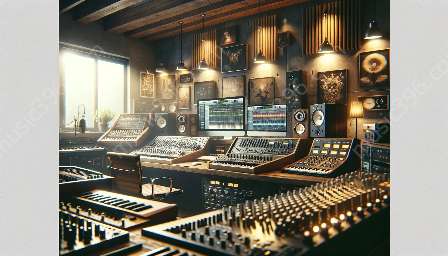Music recording has undergone a remarkable evolution throughout history, with various technological advancements significantly impacting its development. One such groundbreaking invention that reshaped the landscape of music recording is magnetic tape. In this topic cluster, we will delve into the impact of the invention of magnetic tape on music recording and its pivotal role in the history and evolution of music recording technology.
The Era Before Magnetic Tape
Prior to the advent of magnetic tape, music recording relied on mechanical and analog methods. The earliest form of recording involved using phonograph cylinders, a cumbersome and limited medium that required manual rotation. This was followed by the development of shellac records, which marked a significant advancement in recording technology. However, these methods were largely constrained by their inability to support extensive editing and overdubbing.
Revolutionizing Music Recording with Magnetic Tape
The invention of magnetic tape, credited to German engineer Fritz Pfleumer in the 1920s, revolutionized music recording by introducing a more versatile and high-fidelity medium. Unlike its predecessors, magnetic tape allowed for multi-track recording, spurring unprecedented innovation in music production. This development significantly influenced the way music was recorded, as it enabled artists and producers to experiment with layering, editing, and sound manipulation in ways that were previously unattainable.
Impact on Sound Quality
Magnetic tape not only facilitated more flexible recording techniques but also greatly improved the overall sound quality. With its ability to capture a wider frequency range and dynamic range compared to earlier recording media, magnetic tape contributed to the emergence of more sonically rich and immersive recordings. This advancement was pivotal in enhancing the listening experience for audiences and musicians alike, thereby shaping the sonic landscape of various music genres.
Technological Advancements and Music Production
The introduction of magnetic tape laid the groundwork for subsequent advancements in music recording technology. It spurred the development of multi-track recording systems and studio equipment, ushering in a new era of creativity and experimentation in music production. Artists and producers now had the ability to explore complex arrangements, elaborate overdubs, and innovative mixing techniques, thereby expanding the possibilities of musical expression.
Evolution of Recording Studios
The impact of magnetic tape on music recording also extends to the physical spaces where music is created. Recording studios underwent significant transformations, equipped with state-of-the-art tape machines, mixing consoles, and other tools that facilitated the realization of ambitious sonic visions. This led to the rise of iconic studios that became synonymous with landmark recordings, further underscoring the profound influence of magnetic tape on the music industry.
Legacy and Enduring Influence
Decades after its introduction, magnetic tape continues to exert its influence on music recording and production. While digital technology has largely superseded analog tape, the warm and organic sound associated with tape recordings has perpetuated its legacy. Many contemporary artists and producers still seek out analog tape equipment to infuse their recordings with a timeless sonic character, thereby preserving the enduring influence of magnetic tape on the art of music production.
Conclusion
The invention of magnetic tape fundamentally transformed the landscape of music recording, leaving an indelible mark on the evolution of music recording technology. Its impact on sound quality, creative possibilities, and the development of recording studios has played a pivotal role in shaping the way music is created and experienced. As a result, magnetic tape remains an integral part of music history, standing as a testament to the enduring power of innovative technology in the realm of music recording.



































